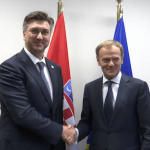ZAGREB, May 11, 2018 – In the five years of its membership of the European Union, Croatia has become an equal actor of European institutions and has progressed economically, while in 1990 it was just a “footnote” on European integration, Prime Minister Andrej Plenković said at a conference at the Zagreb School of Law on Friday.
Plenković made a keynote speech at the opening of a two-day international conference marking five years of Croatia’s EU membership, called “The Role of Law and Courts in a Changing European Union.”
Plenković described Croatia’s achievements during its five years of EU membership as “very solid” and underscored that since 2013 its economy had been growing again. “EU accession marked the end of the crisis for us and that can be felt,” he said.
“We are growing economically. We have a low unemployment rate and consequently a higher employment rate, a better credit rating and a budget surplus. We have become actors in European institutions,” he said and underscored that the best symbol of the advantages of EU membership is the Pelješac Bridge which will receive a 375 million euro grant.
The real financial benefits from EU membership and Croatia’s position will be obvious in about 2023, after ten years of membership, Plenković added. He recalled that Croatia joined the EU much later than other Central and Eastern European countries which entered in 2004, and exploited the enthusiasm of Western Europe for enlargement, while Croatia was “practically in the waiting room.”
It was only in 2014 that Croatia achieved the level of growth it had in 1990, he said. “Central and Eastern European countries had already entered the EU when we just started our negotiations. In 1990, we were practically a ‘footnote country’,” he said.
Plenković underscored that Croatia was alone in its EU negotiations, that it was given a condition to cooperate with the International Criminal Tribunal for the former Yugoslavia (ICTY) in The Hague, and that it had to deal with unjustified meddling in unrelated bilateral issues which set the country back five years. “With all due respect, no one said ‘sorry’. No one has yet apologised to me for that,” he said and added that Slovenia wasn’t the only one guilty of that. “War, aggression, blockades, 15 years’ delay in all. But we managed,” he added.
Plenković underscored two major objectives of Croatia’s European policy: joining the Schengen Area, “something we should be technically prepared for by the end of next year”, and adoption of the euro in a longer term.
President of the European Court of Justice (ECJ) Koen Lenaerts said that Croatia’s accession to the EU on 1 July 2013 was important for balance in this part of Europe after almost a quarter of a century of turmoil.
The European Union is a project of peace founded on democracy, justice and the rule of law, Lenaerts said, comparing it to a builder of bridges between countries and people.
EU membership means greater political control and not less. We can’t achieve anything on our own. We strengthen the member states, we don’t replace them, he said adding that the EU doesn’t want to bring their national identity into question.
Speaking about European law, Lenaerts underscored that it is the domestic law of all member states, including Croatia, and that it is aimed at ensuring a better life and protection for European citizens.









